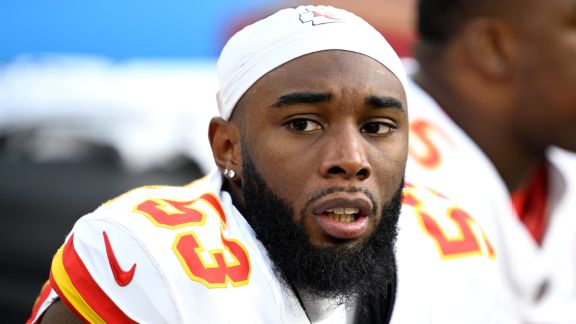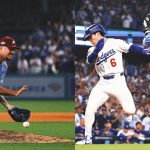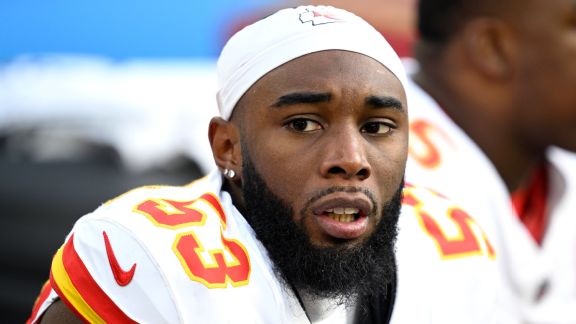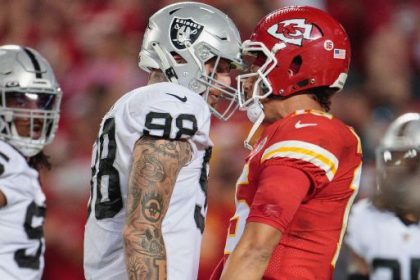
On Thursday, Kansas City Chiefs defensive end BJ Thompson suffered a seizure and then went into cardiac arrest at the team’s practice facility. Thompson, 25, was transported to a hospital by ambulance and was reported to be in stable condition. The Chiefs sent home players and rescheduled their offseason practice.
It is one of several recent heart-related events involving notable athletes.
In December 2023, Luton Town captain Tom Lockyer suffered cardiac arrest on the pitch during his team’s match at Bournemouth. On July 24, 2023, then-18-year-old USC freshman guard Bronny James — son of Los Angeles Lakers star LeBron James — suffered cardiac arrest during a workout at USC. In January 2023, Buffalo Bills safety Damar Hamlin, then 24, suffered cardiac arrest during a game against the Cincinnati Bengals. In June 2022, then-incoming USC freshman center Vince Iwuchukwu, then 19, suffered cardiac arrest during a workout. In June 2021, Danish midfielder Christian Eriksen, then 29, suffered cardiac arrest on the pitch during a Euro 2020 match.
In all six instances, the athletes received immediate care from trained specialists and survived. In May, Lockyer, who had a defibrillator fitted after his December incident, said he hopes to return to the pitch but that he’s “at peace” with the prospect of retirement, too. James, Hamlin, Iwuchukwu and Eriksen have all been cleared to return to play — and, on Dec. 10, 2023, James made his season debut for USC in an 84-79 overtime loss against Long Beach State, scoring four points in 17 minutes of action off the bench.
Each situation drew international headlines and raised questions in and around the sports and medical communities about heart issues among young, seemingly healthy athletes. Studies have been commissioned by leading specialists, and cardiologists around the country have tried to address concerned parents, especially in the era of conspiracy theories and misinformation.
Today, after a yearslong pandemic and several rounds of new vaccines and boosters, cardiologists regularly face questions about how COVID-19 and its vaccines impact heart health.
“We are not seeing a signal that pre-COVID and post-COVID [cardiac] events are any different,” said Dr. Matthew Martinez, director of the sports cardiology and hypertrophic cardiomyopathy center at Morristown Medical Center in New Jersey, and a consulting cardiologist for the National Basketball Players Association.
“What we are seeing, however, is that more people are being evaluated as a result of COVID. So we’re making the diagnosis of underlying congenital heart disease in those who were unaware [they had it], like hypertrophic cardiomyopathy, more frequently than we did before. And because of the fear of myocarditis from COVID, more and more parents and more and more athletes are saying, ‘Hey, I have these symptoms, and I’m worried about it,’ and they’re seeking medical attention.”
Myocarditis is the inflammation of the heart muscle, and it can be found in or develop from viral infections or sometimes in autoimmune diseases. “These inflammatory mediators get stuck inside the heart muscle, and they can make the heart muscles sluggish,” said Dr. David J. Engel, director of the sports cardiology program at NewYork-Presbyterian/Columbia University Irving Medical Center. “And so the pumping strength of the heart goes down, and people can get really sick from it.”
Hypertrophic cardiomyopathy is increased muscle thickness in the heart, and, according to Martinez, it’s a common genetic heart disease found in about one in every 500 people worldwide, according to a 2015 study published in the Journal of the American College of Cardiology. “Most of whom live a normal lifespan and die from something else,” said Dr. Steve Ommen, a cardiologist and medical director of the Mayo Clinic’s hypertrophic cardiomyopathy clinic in Rochester, Minnesota.
It is, however, one of the known causes of cardiac arrest, according to Martinez.
Sudden cardiac arrest is when the heart is beating one minute, and then not beating the next, Martinez said, and the only way to get it pumping again is to use an automated external defibrillator (AED), which sends an electrical shock to the heart. (Cardiac arrest is different from a heart attack, which is when the heart arteries become blocked and the blood flow to the heart muscle is reduced, which leads to damage of the heart muscle. If that damage is extensive, it can cause cardiac arrest.)
“It’s not someone who’s in the hospital with symptoms of chest pain for the last three days or heart failure over the last few weeks, and they’re getting worse and worse and worse, and then they die,” Ommen said. “This is 24 hours from the first symptom to their death. And it generally is caused by electrical irregularities in the heart, which make the heart not effective in the way it pumps.”
In many instances, though, the cause of the cardiac arrest is unknown.
In an effort to better understand the state of cardiac health among athletes, ESPN interviewed four leading cardiologists, several of whom work with professional and collegiate athletes, and examined recent peer-reviewed studies the cardiologists cited as foundational to these issues.
Are athletes more at risk for cardiac-related issues?
“Than the general population? No,” said Dr. Thomas McGarry, an interventional and clinical cardiologist with Oklahoma Heart Hospital Physicians. “But there are certain athletes that are at risk.”
McGarry cites a 2023 study of 76 NCAA and professional athletes who had genetic heart diseases and were allowed to return to play. “And of those 76 individuals, three people had problems, but they all survived because the institutions and/or teams knew what was going on and were able to take care of them very quickly with external defibrillators,” he said.
Ommen likewise notes that, generally, athletes are not at risk for more cardiac-related issues. “For recreational athletes, the answer is undoubtedly no,” he said. “For those of us who aren’t professional athletes, more exercise is always better. There are rare conditions like exercise-induced atrial fibrillation, which is abnormal heart rhythm, which is provoked by exercise. So there’s a few individuals that we’ve identified over the last couple of years that have had that on professional sports teams, and generally gotten treated for it and returned to action. But that’s kind of a rare thing.”
Martinez said the same. “Exercise is medicine. Exercise is our best blood pressure management, it’s our best cholesterol management, it’s our best mental health management, it is a stress reliever,” he said. “For people who are younger than the age of 40, heart-related cardiac risk is often a congenital problem. But for people over the age of 40, it is acquired heart artery disease [heart attacks]. In this group, the best way to prevent sudden cardiac death in that group is with exercise. So exercise doesn’t promote risk; it diminishes risk.”
Can a player with myocarditis or hypertrophic cardiomyopathy still play?
It depends.
With myocarditis, “you’re going to hold someone out and let that heart muscle heal,” Martinez said. “And then once that muscle is healed, you’re going to do a risk stratification evaluation by an expert — an assessment to determine, in part, one’s risk of a cardiac event — to see that they are truly back to that minimal risk that they were in before the myocarditis. And we’re going to do the same thing with hypertrophic cardiomyopathy.”
Other cardiologists echoed this point. Engel cites guidelines from the American Heart Association and American College of Cardiology that a player with active myocarditis should refrain from exercise for three to six months and then be reassessed before returning to play.
“Nearly all of the time, once the inflammation settles down, the heart muscle is left in good condition,” Engel said. “And if the markers of active inflammation are no longer present, then the athlete can return to play.”
Martinez cites the aforementioned 2023 study, of which he is an author, that examined the 76 athletes who had genetic heart diseases. It shows that “having an underlying cardiac disease is not an automatic disqualification, that an athlete with myocarditis or hypertrophic cardiomyopathy continuing to play after careful review can be done,” he said.
What, if any, links exist between the COVID-19 virus and heart issues?
According to each cardiologist, the most common link, particularly in earlier COVID-19 variants, is myocarditis. That COVID-19 could lead to myocarditis wasn’t unexpected, they say, as myocarditis can often be caused by viral infections.
“Viruses have caused myocarditis for as long as we know anything about viruses, and the COVID virus is not any different,” Martinez said. “COVID is one of the viruses that can cause myocarditis. There was myocarditis before COVID, there will be myocarditis after COVID.”
A 2021 study published in JAMA Cardiology — which Martinez helped write — examined 789 professional athletes with COVID-19 infection who underwent a post-COVID cardiac testing as recommended by the American College of Cardiology. Of that group, the prevalence of myocarditis was low: about 0.6%.
In a nationwide April 2021 study in the American Heart Association journal Circulation that examined 3,018 college athletes who had tested positive for COVID-19 and had a cardiac evaluation, heart issues were found in 21 — or 0.7% — of those athletes.
“It’s not a strong link,” Engel said.
What, if any links, exist between the COVID-19 vaccine and heart issues?
All four cardiologists say heart issues are more likely to arise from COVID-19 viral infection than from the vaccines. Citing a 2023 peer-reviewed study in the international scientific journal Biomedicines, Martinez and Engel note that the rate of someone receiving a COVID-19 vaccine and then having myocarditis is 30 out of 100,000, or 0.03%.
“The concern of myocarditis should not be a justification for not taking the vaccine, because the incidence of myocarditis after the COVID vaccine is exceptionally low,” Engel said.









